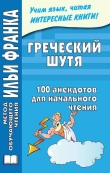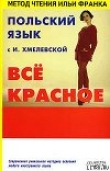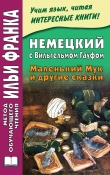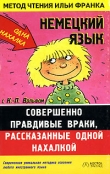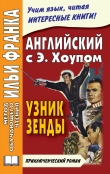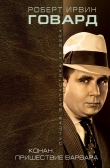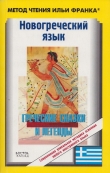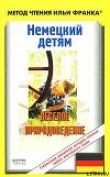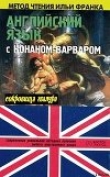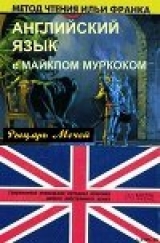
Текст книги "Английский язык с М. Муркоком"
Автор книги: Майкл Джон Муркок
Соавторы: Илья Франк,Андрей Еремин
Жанры:
Языкознание
,сообщить о нарушении
Текущая страница: 13 (всего у книги 36 страниц)
A woman stood there. She seemed quiet and self-contained and had a gentleness about her. Her long black hair was soft and fell to below her shoulders. She was wearing a gown of embroidered samite containing a multitude of rich colours. She smiled at him.
`Greetings (приветствую /тебя/; greeting – приветствие, поклон), she said. `I am Rhalina (я Ралина). Who are you, sir (кто ты, господин)?
`I am Corum Jhaelen Irsei (я Корум Джаелен Ирсеи), he replied (ответил он). Her beauty was not that of a Vadhagh (ее красота не была красотой вадага = была непривычной), but it affected him none the less (но она поразила его, тем не менее; to affect – оказывать действие; волновать, затрагивать; поражать). `The Prince in the (Принц в) …
`– Scarlet Robe (Алом Плаще)? She was plainly amused (она явно /раз/веселилась; to amuse – развлекать/ся/, позабавить). `I speak the old Vadhagh tongue as well as the common speech (я говорю на древнем вадагском языке так же, как и на обычном = современном языке; speech – речь, язык). You are misnamed, Prince Corum (тебя неверно назвали, принц Корум). I see no robe (я не вижу плаща). In fact, I see no (более того, я не вижу; in fact – фактически, на самом деле; более того) …
Corum turned away (отвернулся).
`Do not mock me, Mabden (не смейся надо мной, /женщина/ мабденов; to mock – насмехаться, высмеивать; передразнивать). I am resolved to suffer no further at the hands of your kind (я не желаю больше терпеть /насмешки/ от твоего народа; to be resolved – твердо решиться; to suffer – страдать, терпеть; at the hand of – от руки; kind – сорт, разновидность, род).
beauty [ˈbju:tɪ] amused [əˈmju:zd] tongue [tʌŋ] resolved [rɪˈzɔlvd]
`Greetings, she said. `I am Rhalina. Who are you, sir?
`I am Corum Jhaelen Irsei, he replied. Her beauty was not that of a Vadhagh, but it affected him none the less. `The Prince in the…
`– Scarlet Robe? She was plainly amused. `I speak the old Vadhagh tongue as well as the common speech. You are misnamed, Prince Corum. I see no robe. In fact, I see no…
Corum turned away.
`Do not mock me, Mabden. I am resolved to suffer no further at the hands of your kind.
She moved nearer (она подошла ближе).
`Forgive me (прости меня). Those who did this to you are not our kind (те, кто сделал это с тобой – не из нашего народа), though they be of the same race (хотя и /принадлежат/ к тому же виду). Have you never heard of Lywm-an-Esh (/разве/ ты никогда не слышал о Лиум-ан-Эш)?
His brow furrowed (он нахмурился; brow – бровь, лоб; выражение лица; to furrow – морщить; бороздить). The name of the land was familiar, but meant nothing (название земли было знакомым, но ничего не означало /для него/).
`Lywm-an-Esh, she continued (продолжила она), `is the name of the country from whence my people come (это название страны, из которой происходит мой народ). That people is an ancient one (этот народ древний) and has lived in Lywm-an-Esh since well before the Great Battles of the Vadhagh and the Nhadragh shook the Five Planes (и живет в Лиум-ан-Эш /очень давно/, /он появился/ задолго до того, как великие битвы вадагов с надрагами сотрясли Пять Плоскостей; well before – задолго до, значительно раньше чем; to shake) …
furrowed [ˈfʌrəud] country [ˈkʌntrɪ] ancient [ˈeɪnʃ (ə) nt]
She moved nearer.
`Forgive me. Those who did this to you are not our kind, though they be of the same race. Have you never heard of Lywm-an-Esh?
His brow furrowed. The name of the land was familiar, but meant nothing.
`Lywm-an-Esh, she continued, `is the name of the country from whence my people come. That people is an ancient one and has lived in Lywm-an-Esh since well before the Great Battles of the Vadhagh and the Nhadragh shook the Five Planes…
`You know of the Five Planes (ты знаешь о Пяти Плоскостях)?
`We once had seers who could look into them (у нас некогда были провидцы, которые могли заглядывать в них). Though their skills never matched those of the Old Folk – your folk (хотя их умения никогда не могли сравниться с искусством Древней Расы – твоей расы; skill – искусство, мастерство; умение, навык).
`How do you know so much of the Vadhagh (откуда ты знаешь так много о вадагах)?
`Though the sense of curiosity atrophied in the Vadhagh many centuries ago, ours did not (хотя чувство любознательности угасло в вадагах много веков назад, в нас же – нет = оно сохранилось; curiosity – любопытство, любознательность, пытливость; to atrophy – атрофироваться; истощаться), she said. `From time to time Nhadragh ships were wrecked on our shores (время от времени надрагские корабли терпели крушение у наших берегов) and, though the Nhadragh themselves vanished away (и, хотя сами надраги пропадали), books and tapestries and other artefacts were left behind (книги, гобелены и другие предметы культуры оставались; artefact – искусственный предмет, памятник материальной культуры; to leave behind – оставлять после себя; забывать). We learned to read those books and interpret those tapestries (мы научились читать те книги и понимать те гобелены; to interpret – объяснять, толковать; понимать). In those days, we had many scholars (в те дни у нас было много ученых).
curiosity [, kju (ə) rɪˈɔsɪtɪ] atrophied [ˈætrəfɪd] scholar [ˈskɔlə]
`You know of the Five Planes?
`We once had seers who could look into them. Though their skills never matched those of the Old Folk – your folk.
`How do you know so much of the Vadhagh?
`Though the sense of curiosity atrophied in the Vadhagh many centuries ago, ours did not, she said. `From time to time Nhadragh ships were wrecked on our shores and, though the Nhadragh themselves vanished away, books and tapestries and other artefacts were left behind. We learned to read those books and interpret those tapestries. In those days, we had many scholars.
`And now (а теперь)?
`Now, I do not know (теперь – не знаю). We receive little news from the mainland (мы получаем мало известий с материка).
`What (что)? And it so close (но он так близко)?
`Not that mainland, Prince Corum (не /с/ этого материка, принц Корум), said she with a nod in the direction of the shore (сказала она с кивком = кивнув в направлении побережья). She pointed out to sea (она указала /куда-то/ в море). `That mainland – Lywm-an-Esh – or, more specifically (с того материка – Лиум-ан-Эш – или, точнее), the Duchy of Bedwilral-nan-Rywm, on whose borders this Margravate once lay (герцогства Бедуилрал-нан-Риум, на границах которого это маркграфство когда-то находилось; to lie – лежать, быть расположенным).
Prince Corum watched the sea as it foamed on the rocks at the base of the island (принц Корум наблюдал, как море пенится о скалы в основании острова; base – основа, основание; подножие).
receive [rɪˈsi:v] specifically [spɪˈsɪfɪk (ə) lɪ] island [ˈaɪlənd]
`And now?
`Now, I do not know. We receive little news from the mainland.
`What? And it so close?
`Not that mainland, Prince Corum, said she with a nod in the direction of the shore. She pointed out to sea. `That mainland – Lywm-an-Esh – or, more specifically, the Duchy of Bedwilral-nan-Rywm, on whose borders this Margravate once lay.
Prince Corum watched the sea as it foamed on the rocks at the base of the island.
`What ignorance was ours (каким /огромным/ было наше невежество = насколько невежественными мы были), he mused (задумчиво произнес он; to muse – погружаться в размышления, задумываться), `when we thought we had so much wisdom (когда думали, /что/ у нас так много мудрости).
`Why should such a race as the Vadhagh be interested in the affairs of a Mabden land (зачем такой расе, как вадаги, интересоваться делами мабденской земли)? she said. `Our history was brief and without colour compared with yours (наша история была краткой и беcцветной по сравнению с вашей).
`But why a Margrave here (а зачем здесь /основано/ маркграфство)? he continued (продолжал он). `What do you defend your land against (от чего вы защищаете свою землю/страну)?
`Other Mabden, Prince Corum (от других мабденов, принц Корум).
`Glandyth and his kind (от Гландита и ему подобных).
mused [mju:zd] wisdom [ˈwɪzdəm] brief [bri:f] compared [kəmˈpeəd]
`What ignorance was ours, he mused, `when we thought we had so much wisdom.
`Why should such a race as the Vadhagh be interested in the affairs of a Mabden land? she said. `Our history was brief and without colour compared with yours.
`But why a Margrave here? he continued. `What do you defend your land against?
`Other Mabden, Prince Corum.
`Glandyth and his kind.
`I know of no Glandyth (я не знаю никакого Гландита). I speak of the Pony Tribes (я говорю о племенах на пони). They occupy the forests of yonder coast (они занимают леса = обитают в лесах вон того побережья). Barbarians, they ever represented a threat to Lywm-an-Esh (/эти/ варвары, они всегда представляли угрозу Лиум-ан-Эш). The Margravate was made as a bastion between those tribes and our land (маркграфство было создано как преграда между теми племенами и нашей землей; bastion – бастион, укрепление).
`Is the sea not sufficient a bastion (разве море – не достаточная преграда)?
`The sea was not here when the Margravate was established (здесь не было моря, когда маркграфство было основано; to establish – учреждать, основывать). Once this castle stood in a forest (когда-то этот замок стоял в лесу) and the sea lay miles away to the North and the South (а море находилось в милях /от него/, к северу и югу). But then the sea began to eat our land away (но затем море начало пожирать/поглощать нашу землю). Every year it devours more of our cliffs (каждый год оно поглощает все больше наших утесов; to devour – жадно есть, пожирать; проглатывать). Towns, villages and castles have vanished in the space of weeks (города, деревни и замки исчезли в считанные недели; space – пространство, космос; интервал времени, промежуток). The people of the mainland retreat ever further back into the interior (люди материка уходят все дальше в глубь; to retreat – отступать, удаляться; interior – внутренняя часть, внутренние районы) …
yonder [ˈjɔndə] represented [, reprɪˈzentɪd] sufficient [səˈfɪʃ (ə) nt] devour [dɪˈvauə]
`I know of no Glandyth. I speak of the Pony Tribes. They occupy the forests of yonder coast. Barbarians, they ever represented a threat to Lywm-an-Esh. The Margravate was made as a bastion between those tribes and our land.
`Is the sea not sufficient a bastion?
`The sea was not here when the Margravate was established. Once this castle stood in a forest and the sea lay miles away to the North and the South. But then the sea began to eat our land away. Every year it devours more of our cliffs. Towns, villages and castles have vanished in the space of weeks. The people of the mainland retreat ever further back into the interior…
`And you are left behind (а вас оставили)? Has not this castle ceased to fulfil its function (разве этот замок не прекратил исполнять свое назначение; to cease – переставать, прекращать/ся/; function – функция, назначение; деятельность)? Why do you not leave and join your folk (почему вы не уйдете /отсюда/ и не присоединитесь к своему народу)?
She smiled and shrugged (она улыбнулась и пожала /плечами/), walking to the battlements and leaning out to watch the seabirds gather on the rocks (подходя к зубчатой стене и высовываясь, чтобы посмотреть, как морские птицы садятся на скалы; battlement – зубчатая стена, стена с бойницами; to gather – собираться, скапливаться).
`This is my home (это мой дом), she said. `This is where my memories are (здесь мои воспоминания). The Margrave left so many mementoes (маркграф оставил так много напоминаний /о себе/). I could not leave (я не могла оставить /это место/).
`The Margrave?
`Earl Moidel of Allomglyl (граф Мойдел Алломглилский). My husband (мой муж).
ceased [si:st] mementoes [mɪˈmentəuz] husband [ˈhʌzbənd]
`And you are left behind? Has not this castle ceased to fulfil its function? Why do you not leave and join your folk?
She smiled and shrugged, walking to the battlements and leaning out to watch the seabirds gather on the rocks.
`This is my home, she said. `This is where my memories are. The Margrave left so many mementoes. I could not leave.
`The Margrave?
`Earl Moidel of Allomglyl. My husband.
`Ah. Corum felt a strange twinge of disappointment (Корум почувствовал странное чувство разочарования; twinge – приступ /боли/, угрызение /совести/).
The Margravine Rhalina continued to stare out to sea (продолжала глядеть в море).
`He is dead (он мертв), she said.
`Killed in a shipwreck (погиб в кораблекрушении). He took our last ship and set off for the mainland (он взял наш последний корабль и отправился к материку) seeking news of the fate of our folk (/чтобы/ разузнать новости = узнать о судьбе нашего народа). A storm blew up shortly after he had gone (шторм разразился/разыгрался вскоре после того, как он отплыл; to blow up – начинать дуть; усиливаться /о ветре/; взрывать/ся/). The ship was barely seaworthy (корабль был едва годным для плавания). It sank (он затонул; to sink).
Corum said nothing (Корум ничего не сказал).
disappointment [, dɪsəˈpɔɪntmənt] shipwreck [ˈʃɪprek] seaworthy [ˈsi:, wə: ðɪ]
`Ah. Corum felt a strange twinge of disappointment.
The Margravine Rhalina continued to stare out to sea.
`He is dead, she said.
`Killed in a shipwreck. He took our last ship and set off for the mainland seeking news of the fate of our folk. A storm blew up shortly after he had gone. The ship was barely seaworthy. It sank.
Corum said nothing.
As if the Margravine's words had reminded it of its temper (словно слова маркграфини напомнили ему о его крутом нраве; temper – характер, нрав; сдержанность; вспыльчивость, раздражительность), the wind suddenly blew stronger (ветер вдруг /стал/ дуть сильнее), plucking at her gown and making it swirl about her body (дергая за ее платье и закручивая его вокруг ее тела; to pluck at – дергать, хватать/ся/; to swirl – кружить/ся/; обвивать). She turned to look at him (она повернулась, чтобы посмотреть на него). It was a long, thoughtful stare (это был долгий, задумчивый взгляд).
`And now, prince (а теперь, принц), she said. `Will you be my guest (/не/ будешь ли ты моим гостем)?
`Tell me one more thing, Lady Rhalina (скажи мне еще одну вещь, леди Ралина; lady – госпожа, леди). How did you know of my coming (как ты узнала о моем приходе)? Why did the Brown Man bring me here (почему мохнатый человек принес меня сюда)?
`He brought you at the behest of his master (он принес тебя по повелению своего хозяина; behest – приказ/ание/, распоряжение).
gown [ɡaun] swirl [swə: l] guest [ɡest] behest [bɪˈhest]
As if the Margravine's words had reminded it of its temper, the wind suddenly blew stronger, plucking at her gown and making it swirl about her body. She turned to look at him. It was a long, thoughtful stare.
`And now, prince, she said. `Will you be my guest?
`Tell me one more thing, Lady Rhalina. How did you know of my coming? Why did the Brown Man bring me here?
`He brought you at the behest of his master.
`And his master (а его хозяин)?
`Told me to expect you and let you rest here (сказал мне ожидать тебя и дать тебе отдохнуть здесь; to tell) until your mind and your body were healed (пока твои разум и тело не излечатся). I was more than willing to agree (я была больше, чем готова согласиться = с радостью согласилась; willing – готовый /сделать что-либо/; охотно делающий что-либо, согласный). We have no visitors, normally (у нас нет = не бывает гостей обычно; visitor – посетитель, гость) – and certainly none of the Vadhagh race (и уж конечно никого из вадагского народа).
`But who is that strange being, the Brown Man's master (но кто это странное существо, хозяин мохнатого человека)? I saw him only briefly (я видел его лишь кратко = мельком). I could not distinguish his shape too well (я не мог разглядеть его фигуру слишком хорошо; to distinguish – различить; разглядеть), though I knew he was twice my size and had a face of infinite sadness (хотя я знал, /что/ он в два моих роста и лицо его /выражало/ глубокую печаль; size – размер, величина; габариты; infinite – бесконечный; очень большой).
visitor [ˈvɪzɪtə] briefly [ˈbri:flɪ] distinguish [dɪsˈtɪŋɡwɪʃ] infinite [ˈɪnfɪnɪt]
`And his master?
`Told me to expect you and let you rest here until your mind and your body were healed. I was more than willing to agree. We have no visitors, normally – and certainly none of the Vadhagh race.
`But who is that strange being, the Brown Man's master? I saw him only briefly. I could not distinguish his shape too well, though I knew he was twice my size and had a face of infinite sadness.
`That is he (это он). He comes to the castle at night (он приходит к замку ночью), bringing sick domestic animals that have escaped our stables at some time or another (принося больных домашних животных, которые убежали из наших загонов когда-либо; stable – конюшня; хлев, стойло). We think he is a being from another plane, or perhaps another Age (мы думаем, он существо из другой плоскости или, может быть, из другого времени), before even the Age of the Vadhagh and the Nhadragh (раньше даже = более раннего, чем время вадагов и надрагов). We cannot pronounce his name (мы не можем выговорить его имя; to pronounce – произносить, выговаривать), so we call him simply the Giant of Laahr (поэтому зовем его просто Великан из Лаара).
Corum smiled for the first time (Корум улыбнулся впервые).
`Now I understand better (теперь я понимаю лучше). To him, perhaps, I was another sick beast (для него, может быть, я был еще одним больным животным). This is where he always brings sick beasts (а сюда он всегда приносит больных зверей).
`That is he. He comes to the castle at night, bringing sick domestic animals that have escaped our stables at some time or another. We think he is a being from another plane, or perhaps another Age, before even the Age of the Vadhagh and the Nhadragh. We cannot pronounce his name, so we call him simply the Giant of Laahr.
Corum smiled for the first time.
`Now I understand better. To him, perhaps, I was another sick beast. This is where he always brings sick beasts.
`You could be right, Prince Corum (ты, возможно, прав, принц Корум). She indicated the doorway (она указала на дверной проем = пригласила войти). `And if you are sick, we should be happy to help you mend (а если ты болен, мы будем рады помочь тебе выздороветь; to mend – чинить, латать; улучшаться, поправляться /о здоровье/) …
A shadow passed over Corum's face as he followed her inside (тень скользнула по лицу Корума, когда он шел за ней внутрь /замка/; to pass over – проходить, переправляться, пролетать; быстро пробегать /глазами/).
`I fear that nothing can mend my sickness now, lady (боюсь, ничто не может исцелить мой недуг теперь, леди). It is a disease of the Mabden and there are no cures known to the Vadhagh (это болезнь мабденов, и нет /от нее/ лекарств, известных вадагам).
`Well (что ж), she said with forced lightness (сказала она с притворной веселостью; forced – принудительный, неестественный, притворный; lightness – легкость, несерьезность), `perhaps we Mabden can devise something (возможно, мы, мабдены, сможем что-нибудь придумать; to devise – придумать, изобрести).
disease [dɪˈzi:z] cure [kjuə] lightness [ˈlaɪtnɪs] devise [dɪˈvaɪz]
`You could be right, Prince Corum. She indicated the doorway. `And if you are sick, we should be happy to help you mend…
A shadow passed over Corum's face as he followed her inside.
`I fear that nothing can mend my sickness now, lady. It is a disease of the Mabden and there are no cures known to the Vadhagh.
`Well, she said with forced lightness, `perhaps we Mabden can devise something.
Bitterness filled him then (обида наполнила его затем = после этих слов; bitterness – горечь; обида). As they descended the steps into the main part of the castle (когда они сошли по лестнице в главную часть замка) he held up his stump and touched his eyeless socket (он поднял культю и коснулся безглазой впадины = пустой глазницы).
`But can the Mabden give me back my hand and eye (но /разве/ могут мабдены вернуть мне мои руку и глаз)?
She turned and paused on the steps (она повернулась и остановилась на ступенях). She gave him an oddly candid look (она взглянула на него странно и откровенно).
`Who knows (кто знает)? she said quietly (сказала она тихо). `Perhaps they can (возможно, они смогут).
descended [dɪˈsendɪd] candid [ˈkændɪd] quietly [ˈkwaɪətlɪ]
Bitterness filled him then. As they descended the steps into the main part of the castle he held up his stump and touched his eyeless socket.
`But can the Mabden give me back my hand and eye?
She turned and paused on the steps. She gave him an oddly candid look.
`Who knows? she said quietly. `Perhaps they can.
